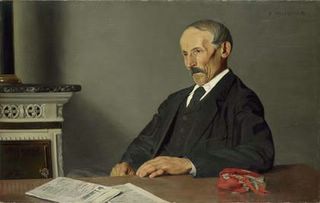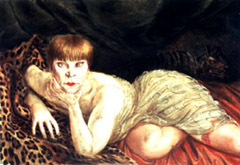Lolita

www.pulodolobo.blogspot.com 
IN THE SPRING OF 1940, on the last crossing of a French ocean liner that would be sunk by German U-boats on its return voyage, Vladimir Nabokov, his wife, and his young son arrived in New York. The family's first, precarious years in America brought many changes, but one element remained constant. Every summer, Nabokov and his wife would drive cross country to the Rocky Mountains, which offered the country's best butterfly hunting.
On those trips, during sudden rainstorms, bouts of insomnia, long drives, and flashes of impromptu inspiration in this or that alpine meadow, the Russian emigre Nabokov began to jot down on three-by-five-inch cards a singular story. This story was to become the greatest and most controversial American novel of the 20th century: ''Lolita."
The summer over, Nabokov continued work on the scandalous tale of the middle-aged Humbert Humbert's love for 12-year-old Dolores Haze. He spent long hours in the libraries of Cornell University--where he had become a professor of Russian literature--reading psychological case studies so as to more effectively impersonate the tones and torments of a madman. He rode around in schoolbuses in order to get the feel of American children's slang. Despite his efforts, the diabolically difficult task he had set himself frustrated Nabokov so much that one day in 1950 he decided to put an end to his suffering and took the unfinished manuscript and note cards to the incinerator behind his house. His wife caught him just in time.
When the 54-year-old Nabokov at last finished ''Lolita" in 1953, it was his 12th novel and his third in English. He presented it to a publisher and was told that the book was excellent, but that if he published it they would both go to jail. He remained tight-lipped on the subject of his new work, and decided to publish it under a pseudonym. With time, however, it became clear to him that nothing was more likely to attract the attention of the censors than anonymous publication, and agreed to publish the work under his own name.
''Lolita" appeared in two pale green volumes from the Paris-based Olympia Press in September 1955. Few readers took notice of the foreign publication until December, when Graham Greene, writing in the London Sunday Times, included the book by the virtually unknown Nabokov in his list of the three best he had read that year. John Gordon, a conservative Scottish editor, examined the unexpected entry in Graham's list and shortly thereafter denounced it in the Sunday Express as ''the filthiest book I have ever read," adding that it was ''sheer unrestrained pornography." Sales soared, interest increased, and when, after much fearful hesitation on the part of publishers, the work was published in an American edition in 1958, it spent six months as No. 1 on the bestseller charts.
''Lolita" was a disturbing book--both in its manner and its matter. Its matter is the relationship--sexual and other--of a European professor and his pubescent American stepdaughter, who he calls by the pet-name Lolita. The book's manner is more difficult to describe. Its form is a faux first-person memoir written, in the words of the dubious European in question, ''first in the psychopathic ward for observation, and then in this well-heated, albeit tombal, seclusion." Nabokov's narrator composes the text in 56 days, at a feverishly brilliant pace. He takes personal, narrative, and linguistic liberties (his native language is French) which are as surprising as they are amusing. He shows brilliance in virtually every respect. The name he elects to write under is Humbert Humbert.
. . .
In 1958, ''L'Affaire Lolita," as the French had christened it, was just beginning its long career. The following year, Nabokov wrote a screenplay based on his novel for Stanley Kubrick and James Harris. The 1962 film propelled Kubrick's career and its success allowed the Nabokovs to retire to Switzerland.
But stranger forms of reception were already underway. As Kubrick was beginning to film, an Israeli guard in a Jerusalem prison gave a copy of ''Lolita" to Adolf Eichmann, who was awaiting trial. An indignant Eichmann returned the book two days later, calling it ''a very unwholesome book." The sulphurous halo of Nabokov's novel was still burning brightly in the popular consciousness of 1960 and it seems that Eichmann's guard gave the book to him as an experiment--a sort of litmus test for radical evil: to see whether the real-life villain, he who impassively organized the transport towards certain death of countless innocents, would coldly, or even gleefully, approve the various and vile machinations of Nabokov's creation.
The incident nicely encapsulates the debates which have animated the book's reception in the past 50 years. Many gifted readers have found ''Lolita" a beautiful and rending tale of love and loss. And many gifted readers have found it a shameless apology for sin and style irrespective of moral content.
A hint as to how best to read it is offered in a foreword to the novel. Therein ''John Ray Jr., PhD" explains how Humbert Humbert's manuscript, titled ''Lolita, or the Confessions of a White Widowed Male," came into his possession and why he has agreed to see it into print. He warns that in reading one will be ''entranced with the book while abhorring its author." The forward was written by none other than Nabokov himself (over the course of the novel this becomes clear--but not so clear that an English press as late as 1979 was fooled and published an edition with the foreword replaced by one commissioned from Nabokov enthusiast Martin Amis). What has so fascinated and divided readers is how one should react to the novel. Or, in other words, how to be ''entranced with the book while abhorring its author."
The author in question, however, is not Nabokov, but his mesmerizing creation Humbert Humbert. In interviews and essays Nabokov was careful to underline that Humbert was a ''scoundrel" and a ''rogue." But Nabokov was also careful to underline that Humbert was not only a scoundrel and a rogue. ''In his last stage he is a moral man," wrote Nabokov of the turn in Humbert's thinking which takes place at the end of the novel, ''because he realizes that he loves Lolita like any woman should be loved. But it is too late, he has destroyed her childhood."
Lolita is the story of Humbert Humbert's ''nymphelepsy"--and, more particularly, his love for a particular ''nymphet." A nymphet is not just any young girl, and not just any lovely young girl. Discerning one, as Humbert ecstatically explains, requires an artistic sensitivity--and leads one to the heart of his undertaking.
''A normal man given a group photograph of school girls or Girl Scouts and asked to point out the comeliest one," Humbert tells us, ''will not necessarily choose the nymphet among them. You have to be an artist and a madman, a creature of infinite melancholy, with a bubble of hot poison in your loins and a super-voluptuous flame permanently aglow in your subtle spine (oh, how you have to cringe and hide!)..."
Humbert prides himself on this artistic sensibility, and more and more compares his love for Lolita to that of an artist for the elusive image he is trying to realize in a given work of art. With startling refinement and real cunning Humbert begins then to lead his readers down a dangerous path.
. . .
One of Lolita's finest readers and first defenders, Lionel Trilling, wrote as early as 1958 that in reading the book, ''we find ourselves the more shocked when we realize that, in the course of reading the novel, we have come virtually to condone the violation it presents.... we have been seduced into conniving in the violation, because we have permitted our fantasies to accept what we know to be revolting."
Humbert's seductive force comes in large part from his freakish rhetorical gifts--and also in large part for one of the seductive comparisons he repeatedly evokes. Just as an artist is first and foremost responsible to his or her own inspiration, Humbert describes himself as first and foremost responsible to his passion. He is soon so consumed by the kindling of his own senses that despite his powers of perception and despite his sensitivity, he acts with callousness and coldness to the nymphet he claims to so ardently love. The lesson he learns he learns ''too late."
It is this lesson learned too late which spurs him to a special undertaking--the writing of his ''confession." Nabokov has Humbert compose a memoir in which he narrates not from the point of view of the regret and repentance which is his own at the time of writing, but from that of the euphoria and haunted rapture which preceded it. He writes from the perspective through which he had gradually persuaded himself that what he was doing to young Lolita could be explained, could be justified, was not so bad after all.
This device allows for the fine pattern of remorse running along the blade of his ''conspiratorial dagger," as he cryptically calls it, to remain for a time invisible. When it ceases to be so, and when he ceases to recreate and relate his coldness for the sake of what he calls ''retrospective verisimilitude," the reader can at last understand why he had chosen to call that dagger ''conspiratorial" in the first place.
Against whom was it turned? Against whom did he conspire? ''Tum-tee-tum. And once more--TUM!," wrote Nabokov in his 1934 novel ''Despair," told from the perspective of an earlier murderer and madman who thinks himself an artist. ''I have not gone mad. I am merely producing gleeful little sounds. The kind of glee one experiences upon making an April fool of someone. And a damned good fool I have made of someone. Who is he? Gentle reader, look at yourself in the mirror."
Bertrand Russell once noted that there is nothing so useful to a democracy as the immunization against eloquence, and Humbert's memoir should be seen in a similar light. What he ultimately tells his readers is: What I have done is monstrous, let no amount of eloquence ever convince you that such acts are anything but. Look at them for what they are. Look at them for the pain they cause.
Stated somewhat differently, the most brilliant American novel of the 20th century, now a round and ripe 50 years old, tells us that the artist cannot live in the world as he lives in the world of words--and that this is a lesson worthy of expressing in the world of words.







